人教新目标八年级英语下册1Unit5--4 导学案
人教版八年级英语下册《Unit 1 What’s the matter》导学案1

本文由一线教师精心整理/word 可编辑1 / 1《Unit 1 What ’s the matter 》导学案1课题 Unit 1 What ’s the matter? Section A导学目标: 1. 疾病与事故伤害的询问与应答:What ’s the matter with …? I have a cold. 2. 情态动词 should 询问及陈述建议 3. 健康与急救常识 4.关爱他人重点:健康问题及提出相关建议的语言结构 难点:词汇量多导学过程 导学过程1. 询问某人患了何种疾病或遇到什么麻烦“怎么了?” What ’s the matter? What ’s the matter with you? 还可以有如下替换:What ’s your trouble? What ’s the trouble with you? What ’s your problem? What ’s the problem with you? What ’s up? What ’s wrong with you?2. 疾病,伤害及救治的表达(1)用 “have/get a(n) +疾病名称” 表示患病:have a cold, have a fever, have a cough, get astomachache, get a toothache, catch a cold(2)用 “be/feel + 形容词”表示不适:be/feel tired, be/feel sick, head feels hot(3)用“get ”表示受伤: get hurt , get cut in the hand, get hit by a ball(4)用“hurt /cut/break+具体部位”表示伤害:hurt my leg, cut her finger, break his arm(5)用“hurt /cut 等+反身代词”表示伤着自己:hurt myself , cut himself(6)用“take (更常见 )/get ”表达诊治:take one ’s temperature, take some medicine, take/get anX-ray(picture)(7)用see 或 go to 表达就医:go to the hospital看医生 go to a doctor go to see a doctor go to the doctor ’s see the doctor 看牙医 go to a dentist go to see a dentist go to the dentist ’s see the dentist3. should (should n’t)(1). 委婉地提出意见或建议时,“应该,应当”You should eat lots of healthy food. (你应该多吃些健康的食品) Should I help you clean the park? (我应该帮你打扫公园吗?) What should I do for them? (我应该为他们做些什么?) (2). 表示义务责任,“应该,应当”You should pay for the books. (你应当付书钱) (3). 命令或要求,语气比较强烈。
人教版八年级英语下册Unit 5 What were you doing when the rain
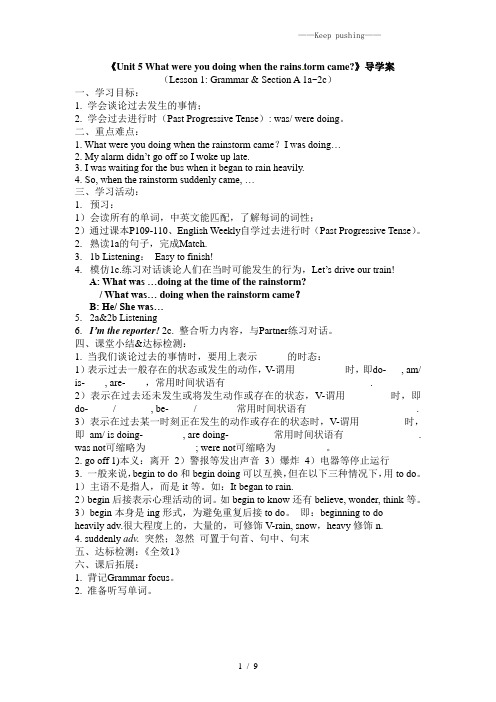
(Lesson 1: Grammar & Section A 1a~2c)一、学习目标:1. 学会谈论过去发生的事情;2. 学会过去进行时(Past Progressive Tense): was/ were doing。
二、重点难点:1. What were you doing when the rainstorm came?I was doing…2. My alarm didn’t go off so I woke up late.3. I was waiting for the bus when it began to rain heavily.4. So, when the rainstorm suddenly came, …三、学习活动:1. 预习:1)会读所有的单词,中英文能匹配,了解每词的词性;2)通过课本P109-110、English Weekly自学过去进行时(Past Progressive Tense)。
2. 熟读1a的句子,完成Match.3. 1b Listening:Easy to finish!4. 模仿1c.练习对话谈论人们在当时可能发生的行为,Let’s drive our train!A: What was …doing at the time of the rainstorm?/ What was… doing when the rainstorm came?B: He/ She was…5. 2a&2b Listening6. I’m the reporter! 2c. 整合听力内容,与Partner练习对话。
四、课堂小结&达标检测:1. 当我们谈论过去的事情时,要用上表示______的时态:1)表示过去一般存在的状态或发生的动作,V-谓用__________时,即do-___, am/ is-____, are-____,常用时间状语有_____________________________.2)表示在过去还未发生或将发生动作或存在的状态,V-谓用_________时,即do-_____/_______, be-_____/________常用时间状语有______________________. 3)表示在过去某一时刻正在发生的动作或存在的状态时,V-谓用_________时,即am/ is doing-________, are doing-_________常用时间状语有_______________. was not可缩略为__________; were not可缩略为__________。
人教版八年级下册英语导学案

Unit1 Will people have robots?Section A period 1 (1a-1c)主备人:曾丝秀审核人:初二英语备课组学习目标:1、学会拼写单词will,robot,everything,paper和won’t2、学会运用will 表示一般将来时和能用will和won’t写出表将来的句型3、创设情景,让学生简单预测自己的未来学习方法:Reading,Listening and writing学习流程及措施:一、预习自学(一)通过预习,完成下列单词和词组的拼写1、将、会;要________2、机器人_________3、每件事情______4、纸,纸张_______5、在人们的家里_____________6、有个机器人__________7、在家通过电脑学习__________8、活到100岁__________9、在五年后__________10、在纸上________(二)根据首字母及句意完成单词1)R______ can do many things for people.2) There are some pieces of p______ on the desk,and you can write on them.3) E_____ is ready .Let’s begin.4) He u____ a pen to write.5)There will be more and more tall b______ in our city.二、研讨一)通过预习完成下列句子1、人们家中将有机器人。
People _____- ______ ______ in their homes.2、人们将不再用钱,每样东西都是免费的People ____ _____ ______. Everything____ ______ _____.3、将来书只在电脑上出现,而不会在纸上.Books _____ ____ ______ on computer, not _____ ______.4、孩子们将不去上学,他们将在家中通过电脑学习。
英语新目标八年级下册unit 1 Will people have robots 课文及导学案

Unit 1 Will people have robots? 课文及导学案SECTION A1a SENTENCES1.People will have robots in their homes.2.People won‟t use money. Everything will be free.3.Books will only be on computers, not on paper.4.Kids won‟t go to school. They‟ll study at home on compute rs.5.There will only be one country.6.People will live to be 200 years old.1c PAIRWORKA: Will people use money in 100 years?B: No, they won‟t. everything will be free. Will people live to be 200 years old?A: Y es, they will.Grammar Focus—Will there be less pollution? —No, there won‟t. There will be more pollution.—Will there be fewer trees? —Y es, there will.—Kids won‟t go to school. Kids will study at home on computers.3aFive years ago, Sally was in high school. She played soccer. She had a cat.Today, Sally is in college. She plays the guitar. She has a dog.In five years, Sally will be a doctor. She will play tennis. She will have a car.SECTION B3aIn ten years, I think I‟ll be a reporter. I‟ll live in Shanghai, because I went to Sh anghai last year and fell in love with it. I think it‟s really a beautiful city. As a reporter, I think I will meet lots of interesting people. I think I‟ll live in an apartment with my best friends, because I don‟t like living alone. I‟ll have pets. I can‟t have any pets now because my mother hates different pets.I might even keep a pet parrot. I‟ll probably go skating and swimming every day. During the week I‟ll look smart and probably will wear a suit. On the weekend, I‟ll be able to dress more casually. I think I‟ll go to Hong Kong on vacation, and one day I might even visit Australia.SELF CHECK2 Predicting the future can be difficult. There are many famous predictions that never came true. Before 1929, there was no sound in movies. The head of one of the biggest movie companies in the United States predicted that no one would want to see actors talk. Of course, he was wrong! In 1977, the head of the largest computer company in the United States said, …“No one will want to have a computer in his or he r home.” He thought that computers would never be used by most people.SECTION 2 While Y ou ReadDo you think you will have your own robot?In some science fiction movies, people in the future have their own robots. These robots are just like humans. They help with the housework and do the most unpleasant jobs.Some scientists believe that there will be such robots in the future. However, they agree it may take hundreds of years. Scientists are now trying to make robots look like people and do the same things as us. Japanese companies have already made robots walk and dance. This kind of robot will also be fun to watch.But robot scientist James White disagrees. He thinks that it will be difficult for a robot to do the same things as a person. For example, it‟s easy for a child to wake up and know where he or she is. Mr. White thinks that robots won‟t be able to do this. But other scientists disagree. They think that robots will be able to talk to people in 25 to 50 years.Robot scientists are not just trying to make robots look like people. For example, there are already robots working in factories. These robots look more like huge arms. They do simple jobs over and over again. People would not like to do such jobs and would get bored. But robots will never get bored.In the future, there will be more robots everywhere, and humans will have less work to do. New robots will have many different shapes. Some will look like humans, and others might look like snakes. After an earthquake, a snake robot could help look for people under buildings. That may not seem possible now, but computers, space rockets and even electric toothbrushes seemed impossible a hundred years ago. W e never know what will happen in the future!语法精讲(一)一般将来时1.主语+am/ is/ are going to +动原do2.主语+助动词will+ do (若主语为第一人称,也可用I/ We + shall do)3.部分动词如:come, go, leave, move, start, arrive, fly等常用进行时结构be+ doing 表示将来;4.表示将要有……, 用:There is/ are going to be +主语+其他;或There will be +主语+其他;E.g.: People will have robots in the future.否:People robots in the future.一般疑问句:people robots in the future?回答:Y es, . / No, .划线提问:people in the future?同义句:People robots in the future.(二)many/ much—more—most 表数量多,可修饰可数名词复数或不可数名词few—fewer—fewest 表数量少,只修饰可数名词复数little—less—least 表数量少,只修饰不可数名词用上述词的适当形式填空:1.They’ll do their work well with money.2.There are / buildings in our city than their city.3.There will be pollution if we plant trees.4.There are too many people here. It’s too crowded.5.I feel better now.6.He’s new here. He has friends, does he?(三)alone: adj./ adv. 表示形体上“单独的,独自地”lonely: adj. 表示精神上“孤独的,寂寞的”1.She is afraid to go out at night.2.It’s hard for him to finish the work .3.She lives and that makes her feel sometimes.(四)except: prep. 除……之外;(不包含…)All the students finished the homework except Nick. (指Nick未完成作业)She goes to work every day except Sunday. (Sunday 除外)(五)It‟s +adj.+ for sb. to do…= 主语+find (think, believe…) it +adj. to do…对某人来说做…太…了E.g.: Maybe these children find it hard to think for themselves when they’re older.= Maybe it’s hard for these children to think for themselves when they’re older.基础夯实一.根据音标和句意拼写单词1.I think r will do housework instead of people.2.Money is important, but money isn’t3.He / / a letter to his brother yesterday.4.He is a worker. He works in a5.Don’t worry about me. I can look after / /.6.He is too young to himself.二、选择填空:1.I saw a boy when I walked along the river.A. swimB. to swimC. swimmingD. swims2.are going home on a train.A. Mr. TurnerB. Mr. Turner’sC. The TurnersD. The turners’3.All the fruit is free. Y ou can eat .A. as many as possibleB. as much as possibleC. as more as possibleD. as many as possibly4.We need time and freedom ourselves after whole day’s work.A. relaxB. relaxesC. relaxingD. to relax5.We find easy to get along with him.A. isB. itC. thisD. that6.Wang Liqin the national team in 1998 and then he a lot of ping pong matches.A. joins; takes part inB. joins; took part inC. joined; takes part inD. joined; took part in7.People use money to buy food, books, bicycles and other things they need.A. a hundred ofB. hundreds ofC. two hundreds ofD. hundred of8.We’ll go for a picnic if it this Sunday.A. don’t rainB. doesn’t rainC. won’t rainD. isn’t raining9.Are you here on business or fun?A. inB. onC. atD. for10.The TV program was very and we all got .A. boring; boredB. bored; boringC. bored; boredD. boring; boring11.To be here at Christmas time is a dream that has .A. be trueB. comes trueC. come trueD. came true12.Please who broke the window.A. findB. look forC. look atD. find out13.I will see you on the moon .A. a dayB. every dayC. one dayD. everyday14.There will a concert in our city.A. haveB. hasC. isD. be15.—Do you like the city life or the country life?—It’s hard to say. In the city it is interesting, but in the country there is pollution.A. less; moreB. more; lessC. more; fewerD. much; much16.My life will be better than it is now.A. a lotB. a lot ofC. a fewD. more17.What will happen to our human 100 years from now?A. 100 years agoB. 100 years before nowC. since 100 years agoD. in 100 years18.This coat doesn’t fit him well, as he has a huge body and the coat is small.A. so; suchB. so; soC. such; suchD. such; so三、用括号内所给词的适当形式填空We can see robots in some places. There are robots 1 (work) in factories. They do simple jobs over and over again. People don’t want 2 (do) such jobs. In some restaurants, we can see robots 3 (say) hello to people or serving dishing. Japanese companies have already made robots (walk) and dance. It’s fun 5 (watch). In the future, there (be) more robots everywhere, and humans will have (little) work to do.四、句型转换1.There is going to be a new building here in 2 years. (同义句)There a new building here 2 years .2.She can sing the song in French. (同义句)She the song in French.3.It took her 500 yuan to buy the ticket. (同义句)She 50 yuan / the ticket.She 50 yuan the ticket.4.My parents will go to Beijing in two years. (对划线部分提问)your parents to Beijing?5.He seems to like this book. (同义句)he likes this book.6.Cities will be big and crowded in the future. (否定句)Cities very big crowded in the future.7.We’ll go out for a walk with you. (同义句)We out for a walk with you.8.The weaher will be sunny tomorrow. (对划线部分提问)the weather tomorrow?五、完成句子1.学习使用计算机对你有好处。
人教版英语八年级下册导学案

Unit4Section A一、学习目标:1) Important words: mad, anymore, message, suppose, hard-working2) Important phrases: watch soap operas, be supposed to do, first of all, pass on, sth. happen on …3) Important Sentences①She said she was mad at Marcia. ②She said she was having a party for Lana.③What happened on “Young Lives” last night? ④You are supposed to meet at the bus stop to return it.4) Grammar: 直接引语和间接引语二、学法指导:运用任务型学习,驱动学生掌握直接引语与间接引语之间的转化三、学习过程:Step1自学单元语法:(直接引语和间接引语)(一) 直接引语和间接引语的含义:引述别人的话时,一般采用两种形式:一是引用别人的原话,两边用引号标出,称为直接引语;二是用自己的语言转述别人的话,称为间接引语。
间接引语在句中实际上就是宾语从句。
(二) 直接引语变间接引语的方法:1.从句人称的变化:由直接引语变间接引语时,从句的主语人称要遵循一主、二宾、三不变的原则。
1)直接引语的主语是第一人称时,变为间接引语时要和主句的主语保持一致。
2)eg:①They said,“We will go there by bus”。
→They said they would go there by bus.3)②He said,“I am visiting my aunt next week.”→He said that he was visiting his aunt next week.2)如果直接引语的主语是第二人称,变为间接引语时要与主句的宾语保持一致。
人教新版英语八年级下册Unit-1-What’s-the-matter第一单元导学案
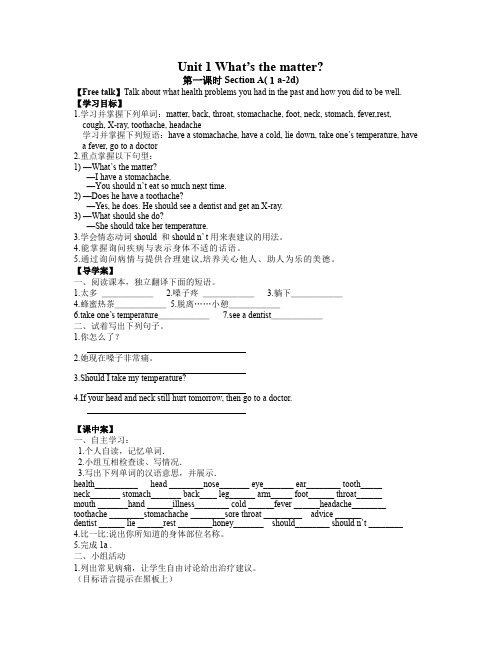
Unit 1 What’s the matter?第一课时Section A(1a-2d)【Free talk】Talk about what health problems you had in the past and how you did to be well. 【学习目标】1.学习并掌握下列单词:matter, back, throat, stomachache, foot, neck, stomach, fever,rest, cough, X-ray, toothache, headache学习并掌握下列短语:have a stomachache, have a cold, lie down, take one’s temperature, havea fever, go to a doctor2.重点掌握以下句型:1) —What’s the matter?—I have a stomachache.—You should n’t eat so much next time.2) —Does he have a toothache?—Yes, he does. He should see a dentist and get an X-ray.3) —What should she do?—She should take her temperature.3.学会情态动词should 和should n’ t用来表建议的用法。
4.能掌握询问疾病与表示身体不适的话语。
5.通过询问病情与提供合理建议,培养关心他人、助人为乐的美德。
【导学案】一、阅读课本,独立翻译下面的短语。
1.太多______2.嗓子疼______3.躺下______4.蜂蜜热茶______5.脱离……小憩______6.take one’s temperature______7.see a dentist______二、试着写出下列句子。
八年级英语(人教新目标)下册导学案+课堂练习:Unit5Whatwerey
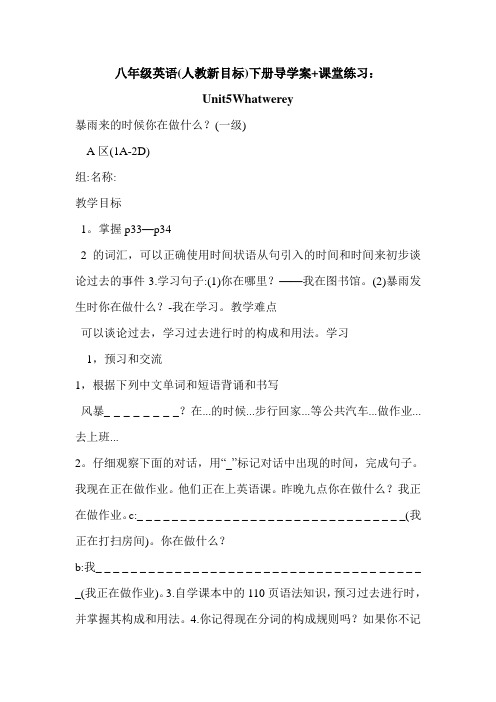
八年级英语(人教新目标)下册导学案+课堂练习:Unit5Whatwerey暴雨来的时候你在做什么?(一级)A区(1A-2D)组:名称:教学目标1。
掌握p33—p342的词汇,可以正确使用时间状语从句引入的时间和时间来初步谈论过去的事件3.学习句子:(1)你在哪里?——我在图书馆。
(2)暴雨发生时你在做什么?-我在学习。
教学难点可以谈论过去,学习过去进行时的构成和用法。
学习1,预习和交流1,根据下列中文单词和短语背诵和书写风暴_ _ _ _ _ _ _ _?在...的时候...步行回家...等公共汽车...做作业...去上班...2。
仔细观察下面的对话,用“_”标记对话中出现的时间,完成句子。
我现在正在做作业。
他们正在上英语课。
昨晚九点你在做什么?我正在做作业。
c:_ _ _ _ _ _ _ _ _ _ _ _ _ _ _ _ _ _ _ _ _ _ _ _ _ _ _ _ _ _ _(我正在打扫房间)。
你在做什么?b:我_ _ _ _ _ _ _ _ _ _ _ _ _ _ _ _ _ _ _ _ _ _ _ _ _ _ _ _ _ _ _ _ _ _ _ _ _ _(我正在做作业)。
3.自学课本中的110页语法知识,预习过去进行时,并掌握其构成和用法。
4.你记得现在分词的构成规则吗?如果你不记得了,赶紧去复习吧!2,合作与探索1。
观察图片并讨论完成1a2。
朗读1a中的句子,然后用1a中的信息写对话,完成1c并呈现出来。
3.用2a和2b中的信息写对话。
小组成员合作完成2c4。
在两天内完成对话,分角色表演,概述关键短语,分组讨论和解决难题,并试着背诵对话。
5.听力训练,完成1b,2a,2b3,点击并升华1。
过去进行时主要指在_ _ _ _ _或_ _ _ _ _采取的行动。
其组成为_ _ _ _ _ _ _ _ _ _ _ _ _ _ _ _ _ _ _ _ _ _ _ _ _ _ _ _ _ _ _ _ _有特定时间状语很常见,至少有昨天8: 00到10: 00,就在那时,至少有昨天9: 00,什么时候等等昨天这个时候,我正在吃作业。
2024人教新目标八年级下册英语Unit 5学习任务单

学习任务单
课程基本信息
学科
英语
年级
八年级下册
课题
Unit5What were you doing when the rainstorm came?SectionA(1a-2d)
The boy___________ at the library after
school.
The woman_____________________ after
work.
The man________________ from the supermarket.
Task 2 Look at the statements below. Are they true or false?
使用教材
人教新目标
出版日期
2013.05
学生信息
姓名
学校
班级
学号
学习目标
1.熟读本课单词
2.掌握词组at the time of rainstorm, wait for the bus, on the street (P33)
go off, rain heavily,take a hot shower, miss the bus, suddenly come,pick up(P34)
get wet, completely wet, wake up, all of a sudden (P100-101)
3.掌握句型
What were you doing when the rainstorm came?
Iwas doing my homework.
最新人教版八年级英语下册导学案(全册 共10个单元)
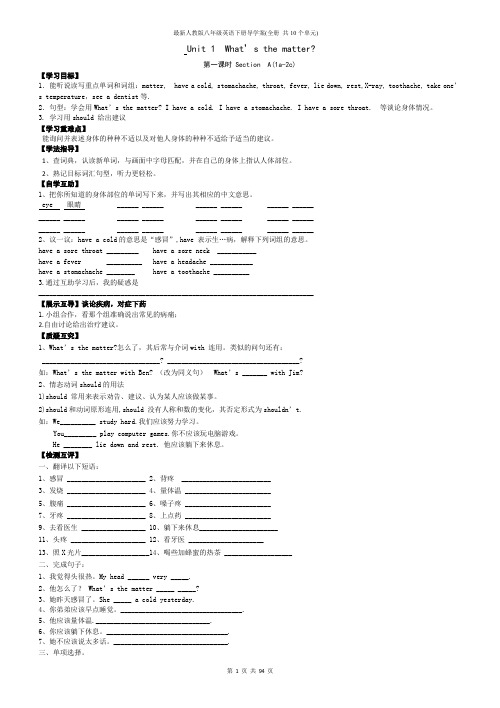
Unit 1 What’s the matter?第一课时 Section A(1a-2c)【学习目标】1.能听说读写重点单词和词组:matter, have a cold, stomachache, throat, fever, lie down, rest,X-ray, toothache, take one’s temperature,see a dentist等.2.句型:学会用What’s the matter? I have a cold. I have a stomachache. I have a sore throat. 等谈论身体情况。
3. 学习用should 给出建议【学习重难点】能询问并表述身体的种种不适以及对他人身体的种种不适给予适当的建议。
【学法指导】1、查词典,认读新单词,与画面中字母匹配,并在自己的身体上指认人体部位。
2、熟记目标词汇句型,听力更轻松。
【自学互助】1、把你所知道的身体部位的单词写下来,并写出其相应的中文意思。
eye 眼睛 ______ ______ ______ ______ ______ ____________ ______ ______ ______ ______ ______ ______ ____________ ______ ______ ______ ______ ______ ______ ______2、议一议:have a cold的意思是“感冒”,have 表示生…病,解释下列词组的意思。
have a sore throat _________ have a sore neck ___________have a fever __________ have a headache ____________have a stomachache ________ have a toothache __________3.通过互助学习后,我的疑惑是_____________________________________________________________________________【展示互导】谈论疾病,对症下药1.小组合作,看那个组准确说出常见的病痛;2.自由讨论给出治疗建议。
最新版本新目标英语八年级下册Unit_1-unit5期中复习重点短语和句子
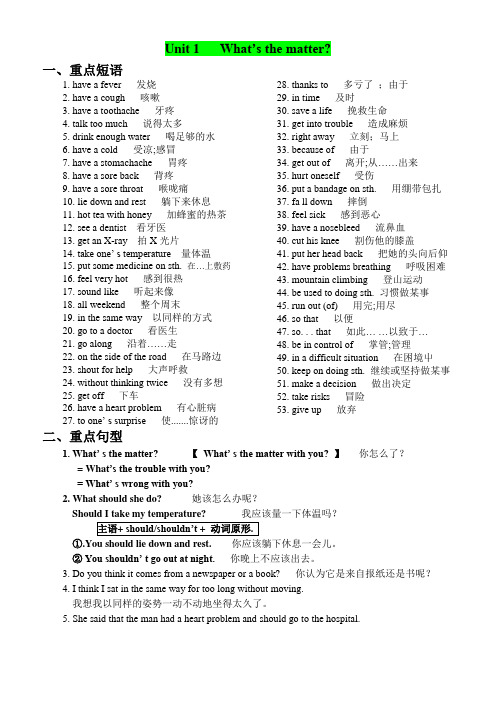
Unit 1 What’s the matter?一、重点短语1. have a fever 发烧2. have a cough 咳嗽3. have a toothache 牙疼4. talk too much 说得太多5. drink enough water 喝足够的水6. have a cold 受凉;感冒7. have a stomachache 胃疼8. have a sore back 背疼9. have a sore throat 喉咙痛10. lie down and rest 躺下来休息11. hot tea with honey 加蜂蜜的热茶12. see a dentist 看牙医13.get an X-ray 拍X光片14. take one‟ s temperature 量体温15. put some medicine on sth. 在…上敷药16. feel very hot 感到很热17. sound like 听起来像18. all weekend 整个周末19. in the same way 以同样的方式20. go to a doctor 看医生21. go along 沿着……走22. on the side of the road 在马路边23. shout for help 大声呼救24. without thinking twice 没有多想25. get off 下车26. have a heart problem 有心脏病27. to one‟ s surprise使.......惊讶的28. thanks to 多亏了;由于29. in time 及时30. save a life 挽救生命31. get into trouble 造成麻烦32. right away 立刻;马上33. because of 由于34. get out of 离开;从……出来35. hurt oneself 受伤36. put a bandage on sth. 用绷带包扎37. fa ll down 摔倒38. feel sick 感到恶心39. have a nosebleed 流鼻血40. cut his knee 割伤他的膝盖41. put her head back 把她的头向后仰42. have problems breathing 呼吸困难43. mountain climbing 登山运动44. be used to doing sth. 习惯做某事45. run out (of) 用完;用尽46. so that 以便47. so. . . that 如此… …以致于…48. be in control of 掌管;管理49. in a difficult situation 在困境屮50. keep on doing sth. 继续或坚持做某事51. make a decision 做出决定52. take risks 冒险53. give up 放弃二、重点句型1. What’ s the matter?【What’ s the matter with you?】你怎么了?= Wha t’s the trouble with you?= What’ s wrong with you?2. What should she do? 她该怎么办呢?Should I take my temperature? 我应该量一下体温吗?①.You should lie down and rest. 你应该躺下休息一会儿。
2020年春人教新目标英语八年级下册Unit4全单元导学案设计(无答案)

2020年春人教新目标英语八年级下册Unit4全单元导学案设计(无答案)2020年春人教新目标英语八年级下册U4 第一课时Section A (1a-1c)课前预习【温故检测】Homework, class , sleep , time, friend, advice, problem .可数名词的有:不可数名词的有:【自学检测】:1. How many __________ (tomato) do you need?2. I have __________(too many, too much) homework to do today .3. My parents allow me __________( hang out ) with my friends.4. I got __________(介词填空)a fight with my best friend.5. Why don’t you __________(go) to sl eep ear lier this evening?点拨升华too muc h. “太多”。
1)修饰动词,放在动词之后。
不要吃太多。
Don’t eat ______ _______2)修饰不可数名词。
妈妈有太多家务要做。
Mom has ______ do.1.allow. “允许,准许”。
_______ housework to1)allow sb to do sth. “允许某人做某事”。
Do your parents allow you _________ (play) computer games?2) allowing doing sth. “允许做某事”他们不允许在这里吸烟。
They don’t allow ________ (smoke) here.3) be allowed to do sth. “被允许做某事”我不被允许外出待到很晚。
I am not allowed _______ (stay) out late.2.get into a fight with sb. 和某人打/吵一架。
英语人教版八年级下册Unit5 GrammarFocus-4c
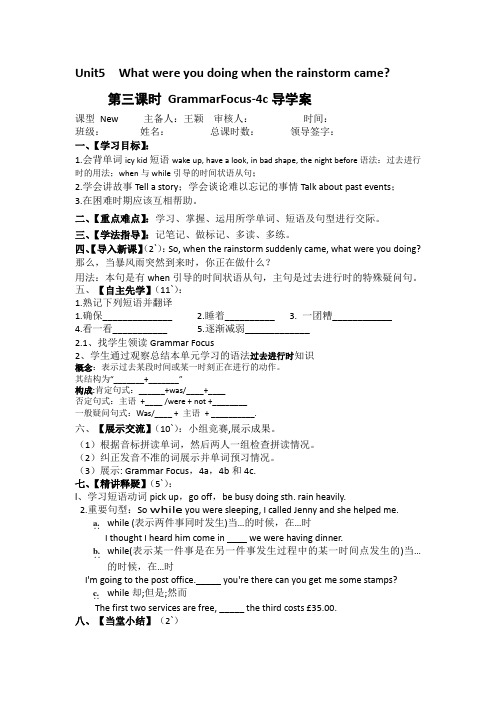
Unit5 What were you doing when the rainstorm came?第三课时GrammarFocus-4c导学案课型New 主备人:王颖审核人:时间:班级:姓名:总课时数:领导签字:一、【学习目标】:1.会背单词icy kid短语wake up, have a look, in bad shape, the night before语法:过去进行时的用法;when与while引导的时间状语从句;2.学会讲故事Tell a story;学会谈论难以忘记的事情Talk about past events;3.在困难时期应该互相帮助。
二、【重点难点】:学习、掌握、运用所学单词、短语及句型进行交际。
三、【学法指导】:记笔记、做标记、多读、多练。
四、【导入新课】(2`):So, when the rainstorm suddenly came, what were you doing?那么,当暴风雨突然到来时,你正在做什么?用法:本句是有when引导的时间状语从句,主句是过去进行时的特殊疑问句。
五、【自主先学】(11`):1.熟记下列短语并翻译1.确保______________2.睡着__________3. 一团糟____________4.看一看___________5.逐渐减弱_____________2.1、找学生领读Grammar Focus2、学生通过观察总结本单元学习的语法过去进行时知识概念:表示过去某段时间或某一时刻正在进行的动作。
其结构为“_______+_______”构成:肯定句式:______+was/____+____否定句式:主语+____ /were + not +________一般疑问句式:Was/____ + 主语+ __________.六、【展示交流】(10`):小组竞赛,展示成果。
(1)根据音标拼读单词,然后两人一组检查拼读情况。
八年级英语下册unit5复习导学案

综合复习编写人隗功霞备课组长签字教研主任签字班级______小组____姓名__________ Unit5 Do you want to watch a game show?一.Words情景喜剧肥皂剧有教育意义的查明,弄清喜剧新闻忍受希望发生介意笑话打算,计划预料,期待讨论毫无意义动作影片文化,文明出现富有的可能,可以原因电影失去准备好的人物装扮,乔装打扮陆军行动动画片著名的开始变得有成就的主要的普通的不幸的女朋友准备好做某事简单的好莱坞代替,替换干得好米老鼠二.Phrases1.介意做某事mind doing2.介意某人做某事mind sb doing/ mind on e’s doing3.看访谈节目watch talk shows4. 向某人学习learn (sth) from sb.5.学习许多关于...的知识learn a lot about6. 计划做某事plan to do sth7.希望做某事hope to do sth/ hope that 从句8.希望某人做某事wish sb to do sth9.发生, 进行go on,/ happen发生在某人身上happen to sb.碰巧做某事happen to do sth10.进行关于…的讨论have a discussion about sth11.跟随某人follow sb12. 接下来发生什么What happens next ?现在正在发生什么事? What is happening now?昨天发生了什么事? What happened yesterday?明天将要发生什么事? What will happen tomorrow?13. 昨天Tom 发生什么事了?What happened to Tom?14. 期待做某事expect to do sth15.期待某人做某事expect sb to do sth16. 想起think of17. 美国文化的一个著名象征one very famous symbol in American culture18. 因……而出名be famous for China is famous for the Great Wall.19.作为......而出名be famous as Yao Ming is famous as a basketball player.20.第一个有声和音乐的卡通the first cartoon with sound and music21. 出版, 发行come out22.受到某人的欢迎be popular with sb.13其中的一个主要原因one of the main reason s24. 一个普通人 a common man25. 人们去电影院看小人物羸people went to the cinema to see the little man win.26.看到某人做了/经常做某事see sb do sth.27.看到/听到/发现某人正在做某事see/ hear/ find sb doing sth.28.尽最大努力去做某事try one’s best to do sth.29. 面对任何危险face any danger30.准备做某事be ready to do sth.(表示结果) get ready to do sth.(表示动作)for sth for sthHe is ready to win the game. 他准备好了赢得比赛.(信心十足)He is getting ready to win the game. 他正在为赢得比赛做准备.(在做准备工作) Everything is ready. Let’s have dinner. 一切都准备好了,咱们吃饭吧.Tomorrow we are going to take a trip to Wuhan. Do you getting everything ready?明天我们就要去武汉旅行了, 你把一切都准备好了吗?31.失去家园lose one’s home / house32他们中的大多数/许多/一些/ 一个/所有most/ many/ some/one / all of them 33. 第一个做某事的人the first one to do sthHe was the first one to get to school.他是第一个到校的人.The boy is always the first one to finish work.这个男孩总是第一个完成工作的人.34.一部令人激动的动作电影an exciting action movie35.来自,’’come from , be fromWhere are you from? Where do you come from?Where is he from? Where does he come from?36. 一个古老的中国故事an old Chinese story37. 她打扮成一个男孩的样子she dresses up like a boy.get dressed 穿衣服dress oneself, 给自己穿衣服dress up 盛装打扮dress up like 打扮成。
(名师整理)最新人教版英语中考单元复习《八年级下Unit 5》考点精练导学案(含答案)
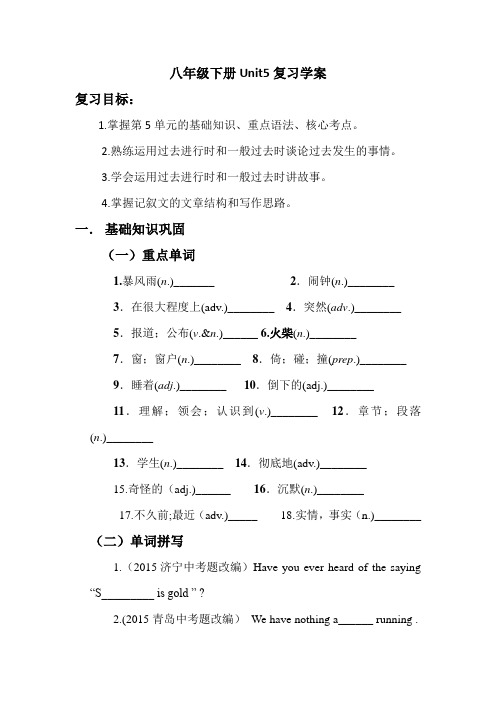
八年级下册Unit5复习学案复习目标:1.掌握第5单元的基础知识、重点语法、核心考点。
2.熟练运用过去进行时和一般过去时谈论过去发生的事情。
3.学会运用过去进行时和一般过去时讲故事。
4.掌握记叙文的文章结构和写作思路。
一.基础知识巩固(一)重点单词1.暴风雨(n.)_______ 2.闹钟(n.)________3.在很大程度上(adv.)________ 4.突然(adv.)________5.报道;公布(v.&n.)______ 6.火柴(n.)________7.窗;窗户(n.)________ 8.倚;碰;撞(prep.)________9.睡着(adj.)________ 10.倒下的(adj.)________11.理解;领会;认识到(v.)________ 12.章节;段落(n.)________13.学生(n.)________ 14.彻底地(adv.)________15.奇怪的(adj.)______ 16.沉默(n.)________17.不久前;最近(adv.)_____ 18.实情,事实(n.)________(二)单词拼写1.(2015济宁中考题改编)Have you ever heard of the saying“S_________ is gold ” ?2.(2015青岛中考题改编)We have nothing a______ running .3.(2016青岛中考题改编)It rained h_______ on my way home yesterday afternoon.(三)词汇拓展1.begin(v.)开始→________(n.)开头;开端2.heavy(adj.)沉的;沉重的→________(adv.)在很大程度上;大量地3.sudden(adj.)突然的;意外的→________(adv.)突然;忽然4.strange(adj.)奇特的;奇怪的→________(n.)陌生人5.wood(n.)木;木头→________(adj.)木头的;木制的6.fall(v.)掉落;下落→________(adj.)倒下的;落下的7.silence(n.)沉默;缄默;无声→________(adj.)沉默的;安静的8.recent(adj.)最近的;近来的→________(adv.)不久前;最近9.true(adj.)真实的;正确的→________(n.)实情;事实10.wind (n. )风→________(adj.)多风的11.ice(n.)冰→________(adj.)覆盖着冰的;冰冷的12. complete(adj.)彻底的,完全的→________(adv.)彻底地,完全地(四)用所给单词的适当形式填空:1.I need ________(silent) when I am studying.2.I haven't seen them ________(recent).3.My brother made a ________(wood) house model by himself.4.Don't always believe advertisement because they may hide some ________(true).5.Everything is hard in the ________(begin), and let us study hard. More practice, much better.(五)核心短语1. (闹钟)发出响声______ 2.接电话________3.进入梦乡;睡着____________4.逐渐变弱;逐渐消失__________5.前往;费力地前进___________________6.沉默;无声__________7.拆除;往下拽;记录___________8.凌乱不堪____________9.说实话_________________ 10.忙于做某事_______________9.对…有(特殊)意义________________________(六) 语法1.过去进行时;2.when,while 引导的时间状语从句课本P36 4a中考链接1.(2014·山东日照中考)—Did you watch the opening ceremony of the World Cup?—No, I ________ an exam.A.have had B.am having C.will have D.was having2.(2013·山东日照中考)—Why didn't you answer my phone call, Jack?—I'm sorry, but I ________ then.A.drove B.drives C.was driving D.have driven二.教材考点精讲考点一pick up的用法【课文原句】I called at seven and you didn't pick up.我七点钟给你打电话,可你没接。
八年级英语(人教新目标)下册导学案+课堂练习题:Unit5-What-were-you-doing-

Unit5 What were you doing when the rainstorm came?(第一课时)Section A (1a-2d)组别:姓名:教学目标1.掌握p33—p34的单词2能正确的使用when 与at the time of引导的时间状语从句初步交谈过去进行的事。
3.学习句子: (1) Where were you when the rainstorm came? —I was in the library.(2)What were you doing at the time of the rainstorm? —I was studying.教学重难点能初步交谈过去进行的事学习了解过去进行时的构成及用法。
学习过程一、预习与交流1、根据下列汉语提示的单词短语识记并默写。
暴风雨_____ 在….的时候_____ 走回家_____等公车_____ 做我的家庭作业_____ 去上班_____2.仔细观察下面的对话,用“_____”标出对话中所出现的时间,并补全句子.(1)A: What are you doing now? B: I am doing my homework now. They are having an English lesson. (2)A: What were you doing at 9 o’clock last night? B: I was doing homework.C:_________________________________(我正在打扫我的房间).(3)A: What were you doing when your mother came back yesterday?B:I ______________________________________(我正在做作业).3.自学课本110页的语法知识,预习过去进行时,掌握其构成及用法4. 你还记得现在分词的构成规则吗?记不得的话就赶紧去复习吧!二、合作与探究1. 观察图片并讨论完成1a。
八年级英语下册Unit5Whatwereyoudoingwhentherainstormcame教学案新版人教新目标版
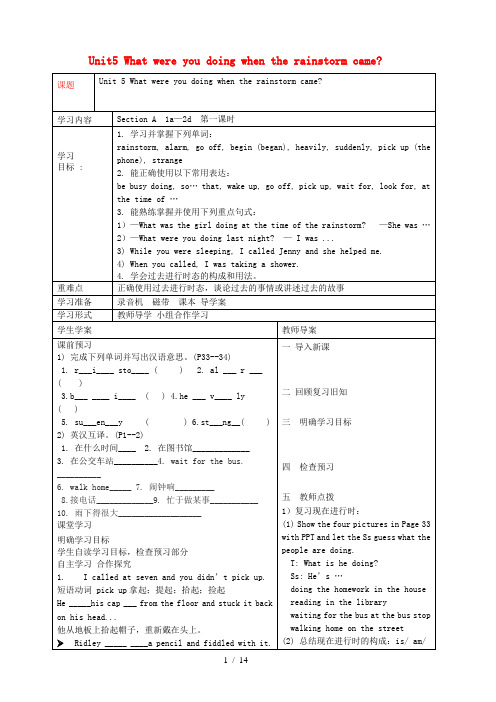
Unit5 What were you doing when the rainstorm came?课堂小结通过本节课的学习我最大的收获是______________________________________________________________________ 感到自己有待加强的是_________________________________________________________家庭作业课堂小结通过本节课的学习我最大的收获是______________________________________________________________________课堂小结通过本节课的学习我最大的收获是______________________________________________________________________ 感到自己有待加强的是_________________________________________________________家庭作业1. 口头作业:利用早读,朗读或背诵课文,体会过去进行时的含义和用法。
2. 书面作业:1)记忆所学单词、短语或重点句型。
2)Finish off the exercises in tongbuxuexi.3. Preview the new words of Section B.教学反思课堂小结通过本节课的学习我最大的收获是______________________________________________________________________ 感到自己有待加强的是_________________________________________________________家庭作业1. 口头作业:利用早读,朗读或背诵录音材料,体会过去进行时的含义和用法。
2. 书面作业:1)记忆所学单词、短语或重点句型。
人教版八年级英语下册全册导学案

人教版八年级英语下册全册导学案本文档主要是对人教版八年级英语下册的全册研究进行导学,以帮助同学们更好地掌握英语知识。
目录1. Unit 1:Have you ever been to a museum?2. Unit 2:What should I do?3. Unit 3:Under the sea4. Unit 4:Why don't you talk to your parents?5. Unit 5:What were you doing when the rainstorm came?6. Unit 6:I like music that I can dance to7. Unit 7:Teenagers should be allowed to choose their own clothes.8. Unit 8:Why don't you get her a scarf?9. Unit 9:What does he look like?10. Unit 10:Where did you go on vacation?研究内容本文档将针对每个单元的研究内容进行介绍。
通过本文档的研究,同学们将了解到:- 每个单元的主题和研究目标- 各种研究活动的具体内容和要求- 重点单词和短语的用法和记忆方法- 语法知识和句型的运用技巧研究建议- 本文档中给出的研究重点和注意事项是研究的核心内容,同学们一定要认真掌握。
- 在研究过程中需要大量的口语练和听力训练,可以通过跟读、模仿、演讲等方式进行练。
- 研究单词和短语需要掌握记忆技巧,可以通过制作单词卡片、做练题等方式进行巩固。
- 研究语法知识需要理解规则和应用场景,可以通过反复练和写作来提高运用能力。
在学习过程中,同学们应该保持积极的心态,认真学习,勤奋练习,相信自己一定能取得好成绩。
人教版八年级英语下册导学案(知识点+练习题带答案)

初二英语下册导学案(知识汇总+练习题)Unit 1单词matter [ˈmætə] v. 重要,要紧,有关系What’s the matter? 怎么了?出什么事了?sore [sɔ:(r)] adj. 疼痛的,酸痛的have a cold 感冒stomach ['stʌmək] n. 胃,腹部stomachache ['stʌməkeɪk] n. 胃痛,腹痛have a stomachache 胃痛foot(复数feet) [fu:t] n. 脚neck [nek] n. 颈,脖子throat [θrəʊt] n. 喉咙fever ['fi:və] n. 发烧,发热lie [laɪ] v. 躺,平躺lie down 躺下rest [rest] n. 剩余部分,其余;放松,休息cough [kɒf] n. & v. 咳嗽X-ray ['eksreɪ] n. X光,X射线toothache [ˈtu:θeɪk] n. 牙痛take one's temperature 量体温headache [ˈhedeɪk] n. 头痛have a fever 发烧break [breɪk] n. & v. 休息,暂停;打破take breaks (take a break)休息hurt [hə:t] v. 伤害,损害,使受伤,疼passenger ['pæsɪndʒə] n. 乘客,旅客off [ɒf] adv. prep. 离开(某处);从…去掉get off 下车to one's surprise 使…惊讶,出乎…意料onto [ˈɒntə] prep. 向,朝trouble [ˈtrʌbl] n. 麻烦,烦扰,问题hit [hit] n. & v. 碰撞,打,打击right away 立即,马上get into 陷入,参与herself [hə:ˈself]她自己,她本身(she的反身代词)bandage ['bændɪdʒ] n. & v. 绷带;用绷带包扎sick [sɪk] adj. 患病的,不适的knee [ni:] n. 膝盖nosebleed [ˈnəʊzbli:d] n. 鼻出血breathe [bri:ð] v. 呼吸sunburned [ˈsʌnbɜ:nd] adj. 晒伤的ourselves [ɑ:ˈselvz]我们自己(we的反身代词)climber [ˈklaɪmə(r)] n. 登山者be used to 习惯于… 适应于…risk [rɪsk] n. & v. 风险,危险;冒险take risks (take a risk) 冒险accident [ˈæksidənt] n. 意外事件;事故situation [ˌsitjuˈeiʃən] n. 状况,形式,情况kg=kilogram [ˈkɪləgræm] n. 公斤,千克rock [rɔk] n. 岩石run out (of) 用尽,耗尽knife [naif] n. 刀,餐刀cut off 切除blood [blʌd] n. 血mean [mi:n] v. 意味着,意思是,意欲get out of 离开,从… 出来importance [ɪmˈpɔ:tns] n. 重要性decision [dɪ'sɪʒn] n. 决心,决定,抉择control [kən'trəʊl] v. 控制,支配,操纵be in control of 掌管,管理spirit ['spɪrɪt] n. 勇气,意志death [deθ] n. 死亡give up 放弃nurse [nə:s] n. 护士Unit1 知识梳理【重点单词】matter [ˈmætə] v. 重要,要紧,有关系What’s the matter? 怎么了?出什么事了?sore [sɔ:(r)] adj. 疼痛的,酸痛的have a cold 感冒stomach ['stʌmək] n. 胃,腹部stomachache ['stʌməkeɪk] n. 胃痛,腹痛have a stomachache 胃痛foot(复数feet) [fu:t] n. 脚neck [nek] n. 颈,脖子throat [θrəʊt] n. 喉咙fever ['fi:və] n. 发烧,发热lie [laɪ] v. 躺,平躺lie down 躺下rest [rest] n. 剩余部分,其余;放松,休息cough [kɒf] n. & v. 咳嗽X-ray ['eksreɪ] n. X光,X射线toothache [ˈtu:θeɪk] n. 牙痛take one's temperature 量体温headache [ˈhedeɪk] n. 头痛have a fever 发烧break [breɪk] n. & v. 休息,暂停;打破take breaks (take a break)休息hurt [hə:t] v. 伤害,损害,使受伤passenger ['pæsɪndʒə] n. 乘客,旅客off [ɒf] adv. prep. 离开(某处);从…去掉get off 下车to one's surprise 使…惊讶,出乎…意料onto [ˈɒntə] prep. 向,朝trouble [ˈtrʌbl] n. 麻烦,烦扰,问题hit [hit] n. & v. 碰撞,打,打击right away 立即,马上get into 陷入,参与herself [hə:ˈself] pron. 她自己,她本身(she 的反身代词)bandage ['bændɪdʒ] n. & v. 绷带;用绷带包扎sick [sɪk] adj. 患病的,不适的knee [ni:] n. 膝盖nosebleed [ˈnəʊzbli:d] n. 鼻出血breathe [bri:ð] v. 呼吸sunburned [ˈsʌnbɜ:nd] adj. 晒伤的ourselves [ɑ:ˈselvz] pron. 我们自己(we的反身代词)climber [ˈklaɪmə(r)] n. 登山者be used to 习惯于… 适应于…risk [rɪsk] n. & v. 风险,危险;冒险take risks (take a risk) 冒险accident [ˈæksidənt] n. 意外事件;事故situation [ˌsitjuˈeiʃən] n. 状况,形式,情况kg=kilogram [ˈkɪləgræm] n. 公斤,千克rock [rɔk] n. 岩石run out (of) 用尽,耗尽knife [naif] n. 刀,餐刀cut off 切除blood [blʌd] n. 血mean [mi:n] v. 意味着,意思是,意欲get out of 离开,从… 出来importance [ɪmˈpɔ:tns] n. 重要性decision [dɪ'sɪʒn] n. 决心,决定,抉择control [kən'trəʊl] v. 控制,支配,操纵be in control of 掌管,管理spirit ['spɪrɪt] n. 勇气,意志death [deθ] n. 死亡give up 放弃nurse [nə:s] n. 护士【重点短语】1.have a fever 发烧2.have a cough 咳嗽3.have a toothache 牙疼4.talk too much 说得太多5.drink enough water 喝足够的水6.have a cold 受凉;感冒7.have a stomachache 胃疼8.have a sore back 背疼9.have a sore throat 喉咙痛10. take risks 冒险11.hot tea with honey 加蜂蜜的热茶12.see a dentist 看牙医13.get an X-ray 拍X 光片14.take one’ s temperature 量体温15.put some medicine on sth. 在……上面敷药16. give up 放弃17. sound like 听起来像18. all weekend 整个周末19. in the same way 以同样的方式20. go to a doctor 看医生21. go along 沿着……走22. on the side of the road 在马路边23. shout for help 大声呼救24. without thinking twice 没有多想25. get off 下车26. have a heart problem 有心脏病27. to one’ s surprise 另某人惊讶的是28. thanks to 多亏了;由于29. in time 及时30. make a decision 做出决定31. get into trouble 造成麻烦32. right away 立刻;马上33. because of 由于34. get out of 离开;从……出来35. keep on doing sth. 继续或坚持做某事36. put a bandage on sth. 用绷带包扎37. fall down 摔倒38. feel sick 感到恶心39. have a nosebleed 流鼻血40. cut his knee 割伤他的膝盖41. put her head back 把她的头向后仰42. have problems breathing 呼吸困难43. mountain climbing 登山运动44. be used to doing sth. 习惯做某事45. run out (of) 用完;用尽46. so that 以便47. so...that... 如此……以至于...…48. be in control of 掌管;管理49. in a difficult situation 在闲境中【重点句型】1. What's the matter with you?= What'the trouble with you?= What's wrong with you? 你怎么了?2. What should she do? 她该怎么办呢?3.Should I take my temperature? 我应该量一下体温吗?4.You should lie down and rest. 你应该躺下休息一会儿。
- 1、下载文档前请自行甄别文档内容的完整性,平台不提供额外的编辑、内容补充、找答案等附加服务。
- 2、"仅部分预览"的文档,不可在线预览部分如存在完整性等问题,可反馈申请退款(可完整预览的文档不适用该条件!)。
- 3、如文档侵犯您的权益,请联系客服反馈,我们会尽快为您处理(人工客服工作时间:9:00-18:30)。
精品“正版”资料系列,由本公司独创。
旨在将“人教版”、”苏教版“、”北师
大版“、”华师大版“等涵盖几乎所有版本的教材教案、课件、导学案及同步练习和检测题分享给需要的朋友。
本资源创作于2020年8月,是当前最新版本的教材资源。
包含本课对应
内容,是您备课、上课、课后练习以及寒暑假预习的最佳选择。
人教版八年级英语下册导学案
本课教学反思
英语教案注重培养学生听、说、读、写四方面技能以及这四种技能综合运用的能力。
写作是综合性较强的语言运用形式, 它与其它技能在语言学习中相辅相成、相互促进。
因此, 写作教案具有重要地位。
然而, 当前的写作教案存在“ 重结果轻过程”的问题, 教师和学生都把写作的重点放在习作的评价和语法错误的订正上,忽视了语言的输入。
这个话题很容易引起学生的共鸣,比较贴近生活,能激发学生的兴趣, 在教授知识的同时,应注意将本单元情感目标融入其中,即保持乐观积极的生活态度,同时要珍惜生活的点点滴滴。
在教授语法时,应注重通过例句的讲解让语法概念深入人心,因直接引语和间接引语的概念相当于一个简单的定语从句,一个清晰的脉络能为后续学习打下基础。
此教案设计为一个课时,主要将安妮的处境以及她的精神做一个简要概括,下一个课时则对语法知识进行讲解。
在此教案过程中,应注重培养学生的自学能力,通过辅导学生掌握一套科学的学习方法,才能使学生的学习积极性进一步提高。
再者,培养学生的学习兴趣,增强教案效果,才能避免在以后的学习中产生两极分化。
在教案中任然存在的问题是,学生在“说”英语这个环节还有待提高,大部分学生都不愿意开口朗读课文,所以复述课文便尚有难度,对于这一部分学生的学习成绩的提高还有待研究。
本资源的初衷,是希望通过网络分享,能够为广大读者提供更好的服务,为您
水平的提高提供坚强的动力和保证。
内容由一线名师原创,立意新,图片精,是非常强的一手资料。
本课教学反思
本节课主要采用过程教案法训练学生的听说读写。
过程教案法的理论基础是交际理论,认为写作的过程实质上是一种群体间的交际活动,而不是写作者的个人行为。
它包括写前阶段,写作阶段和写后修改编辑阶段。
在此过程中,教师是教练,及时给予学生指导,更正其错误,帮助学生完成写作各阶段任务。
课堂是写作车间, 学生与教师, 学生与学生彼此交流, 提出反馈或修改意见, 学生
不断进行写作, 修改和再写作。
在应用过程教案法对学生进行写作训练时, 学生从没有想法到有想法, 从不会构思到会构思, 从不会修改到会修改, 这一
过程有利于培养学生的写作能力和自主学习能力。
学生由于能得到教师的及时帮助和指导,所以,即使是英语基础薄弱的同学,也能在这样的环境下,写出较好的作文来,从而提高了学生写作兴趣,增强了写作的自信心。
这个话题很容易引起学生的共鸣,比较贴近生活,能激发学生的兴趣, 在教授知识的同时,应注意将本单元情感目标融入其中,即保持乐观积极的生活态度,同时要珍惜生活的点点滴滴。
在教授语法时,应注重通过例句的讲解让语法概念深入人心,因直接引语和间接引语的概念相当于一个简单的定语从句,一个清晰的脉络能为后续学习打下基础。
此教案设计为一个课时,主要将安妮的处境以及她的精神做一个简要概括,下一个课时则对语法知识进行讲解。
在此教案过程中,应注重培养学生的自学能力,通过辅导学生掌握一套科学的学习方法,才能使学生的学习积极性进一步提高。
再者,培养学生的学习兴趣,增强教案效果,才能避免在以后的学习中产生两极分化。
在教案中任然存在的问题是,学生在“说”英语这个环节还有待提高,大部分学生都不愿意开口朗读课文,所以复述课文便尚有难度,对于这一部分学生的学习成绩的提高还有待研究。
